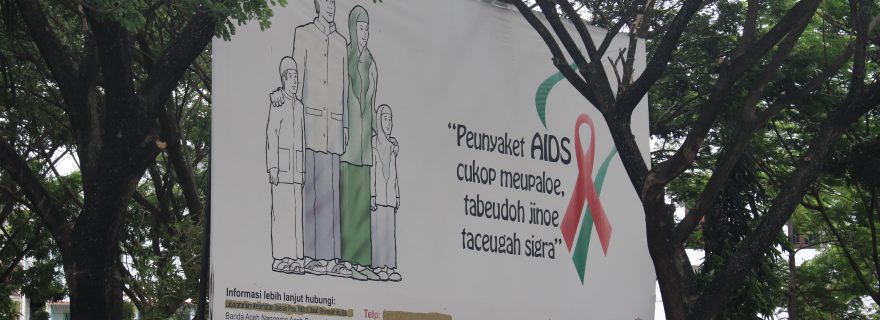AIDS and Islam in Aceh, Indonesia: Toward a Positive Turn?
In Aceh, Indonesia, the stigma confronting people living with HIV/AIDS is exacerbated by the stances of conservative Islamic scholars. However, some recent initiatives suggest possibilities for change.
“Ustadz [religious teacher],” someone in the audience asks, “I once read in the newspaper that someone was cured of HIV after holy verses were read to him.” “Well,” our discussion leader replies, “nothing is impossible, we can be thankful that all trials have hikmah [divine wisdom].”
It is January 2014 and we are at a three-day workshop on HIV and AIDS in a coastal district of the Indonesian province of Aceh. In Indonesia, the Acehnese are often considered to be particularly pious Muslims. This is the region where powerful sultans implemented Islamic laws in the sixteenth century, where at the end of the nineteenth century religious leaders declared Jihad against the Dutch colonizers, and where survivors from the 2004 Indian Ocean Tsunami recovered through prayer, religious chanting, and by confiding to each other that every disaster ultimately has divine wisdom.
This is also the province that, uniquely in Indonesia, started an elaborate process of Sharia implementation in the early 2000s – resulting, among other things, in the public caning of men and women convicted of extramarital sexual activity, gambling and drinking alcohol. In 2018, homosexual men also came to be subjected to punishment by caning, adding to the growing violence against LGBT people that has swept through the Indonesian archipelago over the last years.
The workshop, organized by a local non-governmental organization, is remarkable, not in the last place because awareness raising workshops on HIV are rare in Aceh. Agreed, HIV prevalence here is still low, but the rising infection rates are worrisome and, as I noticed during my thirteen months of ethnographic research on HIV and AIDS, stigmatization of people living with the virus is huge.
Many ordinary Acehnese think of HIV/AIDS as the result of sinful behavior and consider its presence a blow to the province’s Islamic pride. What is even more remarkable about this specific workshop, however, is that it is delivered by two Islamic Javanese interfaith activists who are themselves knowledgeable in Islam, to an audience of Acehnese religious leaders (ulama) (twenty-one men and four women).
With a skillfulness that betrays years of experience, the two workshop instructors involve the audience in sensitive discussions on unlawful sexual intercourse (zina), HIV prevention and care for people living with HIV. On day one, they explain what they call the “medical” approach to HIV, while acknowledging that outside of the scientific field “nothing is impossible.” On the second day, the audience engages passionately in a debate on the permissibility of condoms. Participants fear that the availability of condoms will lead to more unlawful sexual intercourse. Yet many also agree with the instructors that if people engage in unlawful sexual intercourse, preventing HIV transmission is still important.
In the heat of the discussion, one of the ulama in the audience asks: “So if people engage in extramarital sex, is it mandatory in Islam (wajib) that they use condoms? Extramarital sex is sinful. But if they do it with a condom, they also receive merit (pahala) [because they enact something that is mandatory], isn’t that funny?” Another then concludes that perhaps the concept of wajib should be replaced with the general Indonesian word for “should” (harus), relieving the prescription of its Islamic judicial force and merit.
On day three, the participants are asked how, with their new knowledge, they would react to a person living with HIV. Responses vary: “I would say indah Allah, la ilaha ilallah (God is beautiful, there is no god but God)” says one of the men. Another says that after what he has learned during the workshop, he wouldn’t run away anymore, but support the person. One of the women says that she still believes that HIV is a curse. Another acknowledges that she now understands that there are different ways of transmission of the virus and that “we can think of it as a trial, requiring forbearance and patience (kesabaran).”
While most Muslims living with HIV in Aceh whom I came to know resisted the idea of HIV as a curse, many embraced the notion of a trial, a stroke of misfortune that was meant to test their sincerity and patience, and even a second chance they could use to increase their piety and merit. For them, too, HIV was a disaster that contained divine wisdom: something better would be on the horizon.
Discussions during the workshop, as well as responses from people living with HIV themselves, reveal the complex relation of Islam and HIV in Aceh. Although many living with the virus experience that the societal Islamic pride contributes to misunderstanding and discrimination, Islam is also central to positive, future-oriented, narratives of living a good life with HIV. The workshop was a productive attempt to make the ulama more centrally involved in such a more positive turn that could lead to care and support.
The tragedies of exclusion and stigmatization that befall seropositive people in Aceh do currently not indicate that the situation is changing. Yet perhaps more awareness raising, especially among religious leaders, does have something to offer: In one of the group exercises, participants had to answer the question of what people living with HIV need, apart from anti-retroviral therapy. All groups came up with answers such as “empathy, especially from religious leaders,” and “self-confidence, so that they know they are like others.” “We should give hope to these people,” one group concluded, “Allah gives all diseases and He can cure all of them. A trial makes one stronger.”



0 Comments